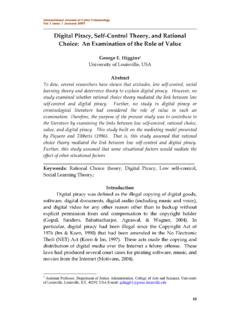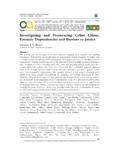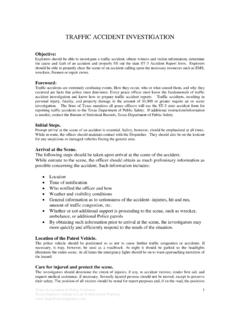Transcription of Investigating and Prosecuting Cyber Crime: …
1 International Journal of Cyber Criminology Vol 9 Issue 1 January June 2015 2015 International Journal of Cyber Criminology. All rights reserved. Under a Creative Commons Attribution-NonCommercial-ShareAlike International (CC BY-NC-SA ) License 55 Copyright 2015 International Journal of Cyber Criminology (IJCC) Publisher & Editor-in-Chief K. Jaishankar ISSN: 0973-5089 - January June 2015. Vol. 9 (1): 55 119. DOI: This is an Open Access article distributed under the terms of the Creative Commons HTUA ttribution-NonCommercial-ShareAlike International (CC-BY-NC-SA ) LicenseUTH, Twhich permits unrestricted non-commercial useT, distribution, and reproduction in any medium, provided the original work is properly cited.
2 TThis license does not permit commercial exploitation or the creation of derivative works without specific permission. Investigating and Prosecuting Cyber crime : Forensic Dependencies and Barriers to Justice Cameron S. D. Brown1 Australian National University, Australia Abstract The primary goal of this paper is to raise awareness regarding legal loopholes and enabling technologies, which facilitate acts of Cyber crime . In perusing these avenues of inquiry, the author seeks to identify systemic impediments which obstruct police investigations, prosecutions, and digital forensics interrogations.
3 Existing academic research on this topic has tended to highlight theoretical perspectives when attempting to explain technology aided crime , rather than presenting practical insights from those actually tasked with working Cyber crime cases. The author offers a grounded, pragmatic approach based on the in-depth experience gained serving with police task-forces, government agencies, private sector, and international organizations. The secondary objective of this research encourages policy makers to reevaluate strategies for combating the ubiquitous and evolving threat posed by Cyber -criminality.
4 Research in this paper has been guided by the firsthand global accounts (via the author s core involvement in the preparation of the Comprehensive Study on Cybercrime (United Nations Office on Drugs and crime , 2013) and is keenly focused on core issues of concern, as voiced by the international community. Further, a fictional case study is used as a vehicle to stimulate thinking and exemplify key points of reference. In this way, the author invites the reader to contemplate the reality of a Cyber crime inquiry and the practical limits of the criminal justice process.)
5 _____ Keywords: Agency, Anonymity, Attorney, Attribution, Capacity, Case, Cloud, Computing, Cooperation, Counsel, Court, crime , Cross-Border, Cryptography, Cyber , Dark, Data, Decryption, Defense, Electronic, Encryption, Enforcement, Evidence, Expert, Forensics, Hack, Illicit, Information, Intelligence, Intercept, International, Internet, Investigation, Judge, Jurisdiction, Jury, Justice, Law, Lawyer, Legal, Liability, Monitoring, Net, Online, Order, Police, Policing, Policy.
6 Privacy, Prosecution, Quantum, Proxy, Reporting, Security, Stalking, Surveillance, Sovereignty, Territorial, Threat, Transparency, United Nations, Universality, Web, Witness. 1 Visiting Associate Investigator and Senior Research Officer - Australian National University | Information Security Professional - Cyber Defense, Strategic Intelligence, Digital Forensics, Incident Response | International Legal Practitioner - Public Policy Engagement, Governance, Data Privacy, Regulatory Compliance, Transactional Risk, Crisis Management, Evidence Authentication.
7 Address: PO Box 328, Lorne VIC 3232, Australia. Email: Brown - Investigating and Prosecuting Cyber crime : Forensic Dependencies and Barriers to Justice 2015 International Journal of Cyber Criminology. All rights reserved. Under a Creative Commons Attribution-NonCommercial-ShareAlike International (CC BY-NC-SA ) License 56 Introduction With escalations in reports of serious Cyber crime , one would expect to see a corresponding increase in conviction rates (Broadhurst, Grabosky, Alazab, Chon, 2014; Kaspersky Lab, 2015; Ponemon Institute, 2015).
8 However, this has not been the case with many investigations and prosecutions failing to get off the ground (Frolova, 2011; Onyshikiv & Bondarev, 2012; Zavrsnik, 2010). The chief causes of this outcome may be attributed to trans-jurisdictional barriers, subterfuge, and the inability of key stakeholders in criminal justice systems to grasp fundamental aspects of technology aided crime . In the same way that science influences the utility of forensic inquiry, the capacity of investigators, prosecutors, judges and jurors to understand illicit use of technology also directly impacts conviction rates (Dubord, 2008; Leibolt, 2010).
9 The ease with which Cyber crime crosses national borders, irreconcilable differences between national legal frameworks, and deceptions employed by Cyber criminals impedes attribution, and prevents crime fighters from interrogating suspects and apprehending offenders. Cyber crime offending can be technically complex and legally intricate. Rapid advancements in the functionality of information communication technologies (ICTs) and innate disparities between systems of law globally are stark challenges for first responders, Investigating authorities, forensic interrogators, Prosecuting agencies, and administrators of criminal justice.
10 It is critically important to explore factors impeding investigation and prosecution of Cyber crime offending to raise awareness and expose these barriers to justice. This paper examines criminal justice responses to Cyber crime under the common law model. The capacity of criminal justice actors to perform their core function is analyzed and discussed. The author contends that the investigation and prosecution of Cyber crime offending, including forensic services in support of inquiries, is hampered by a confluence of factors that influence the criminal justice process.









![ABSTRACT arXiv:1409.1556v6 [cs.CV] 10 Apr 2015](/cache/preview/4/e/0/e/4/4/2/c/thumb-4e0e442c20fc4f8e108fa20a1095af07.jpg)
![Abstract arXiv:1707.01836v1 [cs.CV] 6 Jul 2017](/cache/preview/4/1/7/c/3/c/f/5/thumb-417c3cf524207c81cbb20aac762ce5b4.jpg)